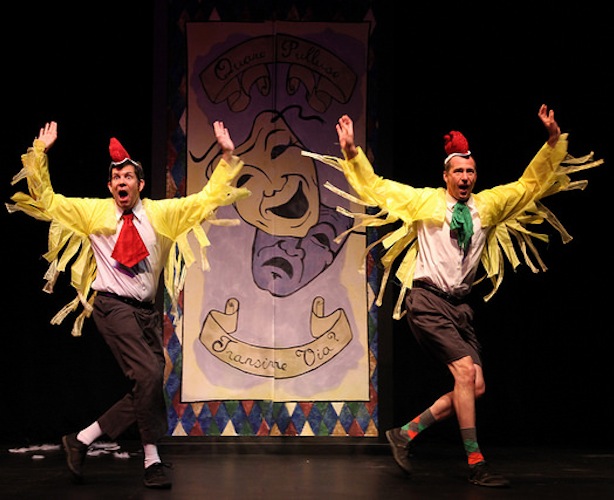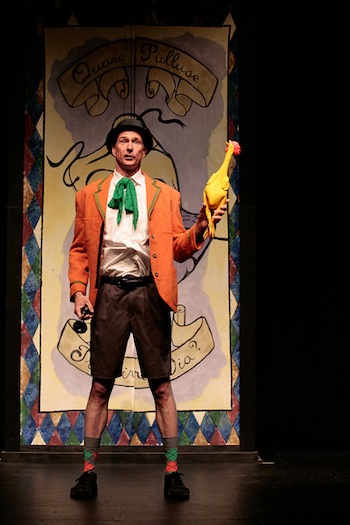Theater Review: Learn to Roll with the Punchlines — “The Complete History of Comedy (Abridged)”
The comic material here may be of the rubber chicken variety, but the Reduced Shakespeare Company performers are remarkably multi-talented men who miraculously craft two hours of diversion.
The Complete History of Comedy (abridged), written and directed by Reed Martin and Austin Tichenor. Staged by the Merrimack Repertory Theatre in the Nancy L. Donahue Theatre, Lowell, MA through May 18.

Michael Faulkner and Dominic Conti of the Reduced Shakespeare Company in “The Complete History of Comedy (abridged).” Photo: MRT.
By Corinne Manning
“If you smile, it’s amusing. If you laugh, it’s funny.”
This proverb-of-sorts is announced near the end of The Complete History of Comedy (abridged)‘s raucous first act. It is a summa (of sorts) for the preceding kaleidoscopic spectrum of slapstick, parody, jokes, and all-around silliness. The production marks the sixth partnership between MRT and the Reduced Shakespeare Company, and the latter is obviously hellbent on staying true to its skewered interpretation of “History.” Its latest “minimum opus” owes its frenetic high spirits to this tradition of reductive contemporary satire, which at times is aimed at taunting as well as amusing audiences.
The MRT audience members around me were more than willing to find the concatenation of japes funny. I found myself smiling more often than laughing.
But that that doesn’t mean I didn’t enjoy myself. The comic material may be of the rubber chicken variety, but the performers are three remarkably multi-talented men who miraculously craft two hours of diversion with nothing to assist their adroit pizazz but a bare stage, a black box, and myriad props, both kitschy and clever. The chemistry among these three “fools” — known offstage as Dominic Conti, Jerry Kernion, and Michael Faulkner — is rooted in a near-symbiotic fusion of eccentricities, an antically playful back and forth generated out of various kinds of craziness. The infectious clowning of Conti, particularly his near-manic physicality, lends the production a wonderful dose of untethered hysteria.
The production’s strong points are its nimble examples of mime and slapstick. The cast’s timing is so on the mark that certain sketches come off as choreographed dances rather than a series of timed pratfalls. When coupled with the visual elements supplied by well-sued stage technology the result moves from funny to uproarious. In a tribute to the late Charlie Chaplin, for example, the company brilliantly employs a strobe light to capture the grainy, uneven look of the silent film in a way that (quite appropriately) leaves one almost without words. Another effective gag involves the repeated use of a projector — here the punchline derives not from what’s onscreen, but from the struggle to find and control the clicker …an amusing argument that often ends with Conti reduced to hapless frustration.

Dominic Conti of the Reduced Shakespeare Company with the king of comedy — a rubber chicken. Photo: MRT.
But while this History lesson receives high marks when it comes to slapstick, its attempts at stand-up leave more than a little something to be desired. In a sense, this is where the evening’s ambition to be “complete” works against itself. The show claims to concentrate decades of comedic tradition, meaning that there’s a pretty good chance you’ve heard some of this stuff before. But the problem is that the script does not reflect the rich and varied forms of monologue comedy. The result is humor that is sometimes bawdy, sometimes corny, but disappointingly simple and straightforward. It doesn’t take much to figure out the punchline to some of these clunkers. And in some cases it’s not even about seeing the gag coming — it’s about watching it enter the room with a drum roll and a flourish of trumpets. Viewer take note: this version of comedy’s history omits the high-brow witticisms of Noel Coward (as well as the cutting political satire of Lenny Bruce or Richard Pryor). The jig is up as soon as Faulkner brings two rather ominous-looking pies onstage.
Then, too, there is the show’s odd and trite premise, a plot point which has Faulkner, Kernion and Conti uncovering an ancient Chinese book on the art of comedy (which, in a humorous twist, turns out to have been authored by the brother of The Art of War’s Sun Tzu). The problem-beset contemporary world seems to be losing its sense of humor, and it somehow falls to these three to brighten things up by finding the book’s missing thirteenth chapter. This idea is supposed to tie everything together, but the upshot is confusion and disorder. The concept often disappears during the proceedings enjoyable stream of gags, puns, and scatological humor. Whenever Faulkner, Conti or Kernion return to the ‘concept’ the trio look impatient, as if they have to man up and take their medicine: “Oh, we still need to talk about this, don’t we?”
The Complete History of Comedy (abridged) marks the end of MRT’s 2013-2014 season, and its generally engaging dynamism makes it an appropriate capstone to what has been an eclectic period in the theatre’s long career. The RSC is set to return to Lowell this summer, where they will showcase a new, 10-minute piece lampooning the MRT during the company’s thirty fifth anniversary gala. Here’s hoping they leave Sun Tzu’s brother’s comedy manual at home.
Corinne Manning is a recent graduate of Wheaton College, where she earned her BFA in English and Theatre Studies. She has garnered over thirteen years’ experience in the performing arts in both local community and college theatre. She can be contacted at manning_corinne@wheatoncollege.edu
Tagged: Austin Tichenor, Corinne Manning, Merrimack Repertory Theatre, Reed Martin

